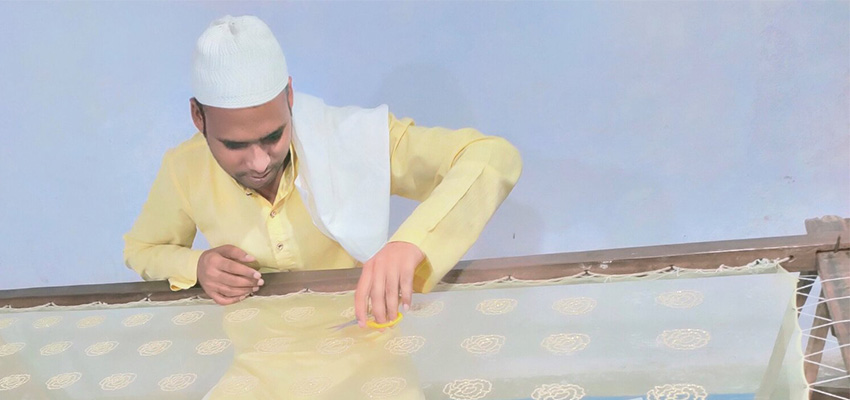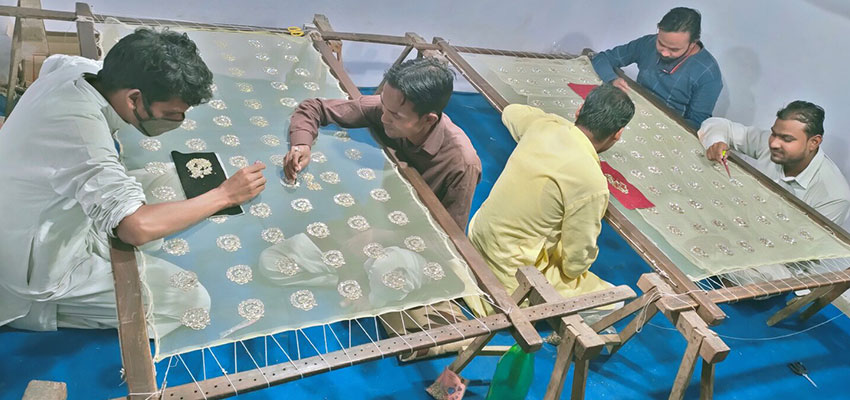
Original blog post on Upaya Social Ventures website.
Smita and Shuchi Singh are 2021 Scale-Ups Accelerator Fellows. The Scale-Ups Accelerator is an initiative created by Upaya Social Ventures and MIT D-Lab to increase capital flows to women entrepreneurs in India. Below is her interview with Upaya's Marketing and Communications Manager Heather Targosz.
Sisters and business partners, Smita and Shuchi Singh, are very different from one another, but it’s their varied interests and skill sets that make them an ideal entrepreneurial team. Smita, the creative, passionate sister, has spent more than a decade traveling and living in small artisan villages, getting to know local craftsmen and working in cluster development. Shuchi, her older sister, spent over a decade working in high-pressure corporate jobs in finance to ultimately start a buying house in Hong Kong.

Together they co-founded Mirandola Designs to manufacture handwork in India and export to fashion houses, designers, brands, and manufacturers in Europe, US, and Asia. In 2018, they decided to start taking some of their production orders directly to village craft clusters—where the artisan families live.
Faced with a myriad of new challenges—compliance, quality standards, and workforce training—the pair tackled many bottlenecks to successfully implement pilot projects. Today, they have regular work going to village clusters, creating livelihood opportunities for craftsmen in Uttar Pradesh.
Smita and Shuchi are members of the 2021 Scale-Ups Accelerator cohort in a program run by Upaya and MIT D-Lab. They and the eight other women entrepreneurs in the cohort share a goal to create sustainable livelihoods in India’s marginalized communities. We had the pleasure of talking with Smita and Shuchi to hear more about how they started their businesses, and what has kept them focused on impact.
Why did you decide to start your own business together?
Smita: The start had been a little organic. We both knew we had a complementary set of skills, so we were trying to see if we could work with it. I was, at that time, working with handwork clusters and conducting workshops. And Shuchi was in her corporate job outside India. We came together to start our own company and named it Mirandola—after a Renaissance philosopher who believed in the unlimited potential of mankind.
What problems in the industry are you trying to address?
Shuchi: In our industry, we see artisans leave their families behind and migrate to cities to work with domestic brands or export houses. One way to reduce this is by creating dignified continuous livelihoods at the village level. We believe our role here is to get regular work to artisans in their hometowns or villages. That’s the best thing we can do for the crafts to thrive and be passed on to the next generation.
What motivated you to want to work directly with artisans?
Shuchi: I knew that problems exist and working with clusters was a huge leap of faith. It didn’t come as something we needed to do, we just wanted to do it. Until then we were primarily working as a regular export house in Mumbai. The work we were doing was beautiful, but we wanted to consciously start working directly at village clusters of artisans.
Smita: I have been across the country. I have stayed with artisans in their villages in Gujarat, Kerala, Maharashtra, Pondicherry... I stayed at the ground-level, worked with them, conducted workshops and developed designs. That’s when I realized what has been missing. There is a massive disconnect between work of artisans in rural villages and that at export hubs in cities. It’s the same artisan who migrates to the city for work, but what he or she executes is of a completely different standard. This gap in the finesse and execution between city and village cluster level is what I wanted to bridge.
The people you meet in villages—irrespective of whether they are financially secure or not—their big-heartedness is something you cannot replace. I missed that genuine warmth.

How has Covid impacted your industry and the communities in which you work?
Smita: Covid has had a severe impact - sales have dried up and orders slowed down.
The only silver lining is that some artisans have started exploring social media - creating accounts, showcasing their work, and approaching clients directly. This has helped artisans understand the new markets, client requirements and the difference good quality can make to sales. It has helped artisans break barriers and create earnings for themselves.
Having said that, this has not compensated for loss of earnings. The magnitude of impact of COVID on artisans and their families can’t be taken away and we all hope the situation eases sooner than later.
What challenges did you face early on in your entrepreneurial journey?
Shuchi: I think there were only challenges! Definitely, we’re not the first organization to work directly with artisan clusters. Many people—NGOs, international fashion houses, domestic companies—work with craft clusters. However, to meet the extremely stringent quality criterion of exports makes working at village clusters sometimes unfeasible and at other times unviable.
But we had the conviction, and we wanted to do it. We thought, it will take a little innovation, it will take a little processing, but do it, try it. In hindsight, because we have been able to smoothen it out, it seems easy. But to get the pilot rolling took months of coordination, convincing all parties, and just sheer obstinate persistence.
We were extremely fortunate because we already had clients and export orders at our Mumbai hub. This helped give everyone down the supply chain comfort that this wasn’t a one-off experiment.
What is your relationship with the artisans today?
Smita: They rely on us for work. It’s a relationship that’s now established and there’s an expectation that it will continue.
We try to visit them once a month and we talk on the phone regularly. There are open channels of communication. During the first lockdown, there was no work for some months. We have been able to provide food and rations for the families. They know that we are there for them, even when we haven’t been able to visit them as often during COVID.
At our end, we feel extremely fortunate to be entrusted with their commitment and trust.
What is your vision for your business?
Smita: I understand the beauty of handwork, the unique space India has in fashion, and how much more scope we have. Extremely high quality work for fashion houses and brands can, with some effort, be done directly in the village craft clusters where both the crafts and artisans come from. This indeed would ensure dignified livelihood, reduce urban migration and also help the crafts to survive.
Shuchi: Our long term vision is to plug the gap between client and craftspeople. We don’t intend to be the middlemen—the quintessential trader who keeps the margin. We are the facilitators... adding value in design, focussing on innovation to make the applications contemporary and relevant to current times, training artisans, giving them avenues for continuous and sustained income so they know this is a career, even for their next generation.
How have you stuck together during this journey?
Smita: For one, if you are working with your sibling, there is nowhere to go! Jokes apart, it’s not been an easy journey. At least twice, I can remember, we had to realign our vision. But the belief in our work is why I’ve stuck with it. It has given me scope to grow—it has made me an entrepreneur.
Shuchi: It’s been a good, complementary relationship where we have both learned a lot from each other. Like Smita says, this journey gives her a scope to grow—for me it gives an anchor. Because I’ve done very well professionally, but I didn’t have a passion point. Whereas Smita is extremely well-centered in what drives her, what gives her joy. This is the world she opened for me.
What keeps you up at night?
Smita (laughing): I think for Shuchi it’s monthly targets.
For me, it’s getting regular work to the clusters. Because we have seen how much of an impact it can create. If work doesn’t go for a week, we’ve seen how much that affects livelihoods. So we would really like to make sure that things keep going regularly, especially during times of lockdowns and such.
What has been your biggest takeaway as entrepreneurs so far?
Shuchi: There is a huge respect for artisans at crafts level. They are very proud people. What they carry within themselves is amazingly valuable - they are in some sense purveyors of not just our crafts but our culture, our essence as a country.
What has been your biggest aha moment?
Shuchi: The first time we got a very big order executed in the cluster in record time—I think we surprised ourselves. Because that was a big order even by Mumbai standards, and we had to expand the scope and capacity of the cluster. When the shipment of that order was released to the client, it was a huge moment for us! That, not only is this doable at a small scale—the export of work executed at clusters—but it is a commercially viable and scalable business model! It’s one thing when you can conceptualize something, but then it actually happens. It gave us a lot of confidence. And it also put the clusters’ faith in us more.
Was there a moment when you thought you might fail? How did you navigate that?
Smita: It just happened recently. We tried a new cluster, and because of COVID we couldn’t travel and couldn’t put our full QC in place. The cluster was also trying something new, and it wasn’t successful. We realized that this is not something we could do. If it’s not happening in front of us—where we can visit and confirm and have our own dedicated team to oversee—we should not be doing it at all.
What advice would you give to other aspiring entrepreneurs?
Shuchi: Listen to the client. You need to believe in yourself and be persistent, yes. But what is also very important is listening to clients and assimilating that feedback. You need to have the adaptability to change all the time.
Smita: Do not enter it if you are not ready to change. And if you’re looking for quick money then entrepreneurship is not for you. It has to be a passion.
More Information
MIT D-Lab Scale-Ups Fellowship
Contact
Jona Repishti, MIT D-Lab Social Entrepreneurship Manager

